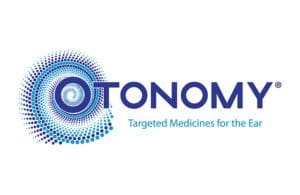 Neurotology-focused biopharma Otonomy (Nasdaq:OTIC) will cease development of OTO-313 after the experimental drug failed to show clinically meaningful benefit in a randomized, placebo-controlled Phase 2 trial.
Neurotology-focused biopharma Otonomy (Nasdaq:OTIC) will cease development of OTO-313 after the experimental drug failed to show clinically meaningful benefit in a randomized, placebo-controlled Phase 2 trial.
The company’s lead asset, OTO-313, did not meet either primary or secondary endpoints in the study, which involved 152 patients with persistent, unilateral tinnitus of at least moderate severity.
OTO-313 is a formulation of the selective N-methyl-D-aspartate (NMDA) receptor antagonist gacyclidine.
The San Diego–based company’s share price dropped almost 80% in mid-day trading to $0.31. On March 13, 2015, its stock price hit an all-time high of $39.36.
[Related: Researcher: Neuroinflammation may be behind tinnitus reports in some COVID-19 vaccine recipients]
The primary endpoint was related to an at least 13-point improvement on the Tinnitus Functional Index (TFI) one month and two months following treatment. For context, the TFI breaks tinnitus severity into five categories. At the bottom, a score of 0–17% indicates that tinnitus is not a problem. Conversely, a score of 73–100% means that the condition represents a very big problem.
A total of 77 recipients received an intratympanic injection of OTO-313, while the other 75 received a placebo.
Clinical trial investigators followed the patients for 4 months.
“These results were unexpected with a much higher placebo response than observed in the prior Phase 1/2 study,” said David A. Weber, president and CEO of Otonomy.
After ceasing the development of OTO-313, Weber noted that the company would “implement other measures to extend our cash runway.”
Otonomy plans to focus on the hearing loss drug candidate OTO-413.
The company announced positive data from a Phase 2a study in April.